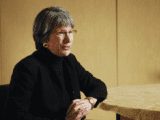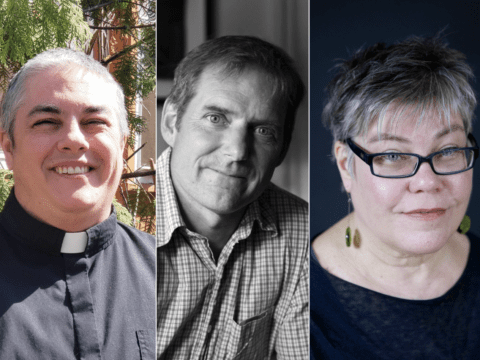“What would it take for you to denounce your faith in God?” bellows a smirking man named Bruce sitting directly across from me at a banquet table. Here we go again, I think. This is my third day at the annual convention of the Atheist Alliance International in Long Beach, Calif. I’ve just introduced myself as a writer for a Canadian church magazine, and Bruce seems intent on making sport of my beliefs.
Possible answers flash through my mind: The death of a loved one? Aliens landing on Earth? The end of the world? None of these answers seems to fit. “I don’t know that I can answer that,” I say, conscious of the eight other people at the table staring at me. “Well,” Bruce says, “you think about it and get back to me. In the meantime, let me tell you something. For me to start believing, God would have to write his name — on the moon — in Hebrew. Then, maybe.”
You may unsubscribe from any of our newsletters at any time.
You might assume anyone so committed to atheism that they’d attend an atheist convention would be something like Bruce: arrogant, angry, paranoid about people of faith, reacting to a childhood spent in oppressive fundamentalism, scheming to convince “theists” to drop their destructive religions and embrace rationality and science, and every bit as fanatical as those they oppose. Certainly that’s what I assumed.
The not-believing-in-God part notwithstanding, atheists — at least those I met — are actually as diverse a group of people as you’d find anywhere. Many had come to this convention seeking a safe place to express their views without fear of condemnation and looking for a bit of moral courage in their fight for the right to be non-religious. In the post-9/11 world of radicalized religion, their movement has gained momentum and has itself radicalized.
For me, spending the weekend as the lone believer on a permanently docked 1930s ocean-liner-cum-hotel was an opportunity to throw my mainline Protestant faith and personal convictions into the ocean of hyper-rationalism to see if any of it floated.
I confess that I worried at first about how I’d be received. At the conference’s kickoff event, I meet Carlos Bertha, a 40-something philosophy professor at the United States Air Force Academy, his son, and Samantha Stein, a 22-year-old Brit who gushes, “I love Richard Dawkins!” She is starting a master’s degree in religion and anthropology so she can better understand why people form religions. I tell a panicky half-truth: that I work for a small Canadian magazine focused on social justice, ethics and lifestyle — and leave out its affiliation with a church. Bertha asks, “So, you’re an atheist then?” I stammer, “Ya, well, I don’t know.” He says, “Hey, no judgments here.”
Later, we head to an outdoor patio that offers a spectacular view of the Long Beach skyline. People tell me that they feel victimized by Christians who are turning their beliefs into laws, stopping stem cell research, outlawing abortion and excluding gays and lesbians; and by Christians who treat them as though they have no moral centre. I point out that lots of liberal Christians aren’t as bad as all that and ask, “Do you believe that even mainline Christians are preventing the world from becoming more rational?” “Yes,” they answer. “But at least they’re nice about it.”
Then one woman says: “So if you’re not an atheist, then what are you?” Someone else pipes up: “You don’t have to answer that.” I take the escape and say goodnight. Heading back to my room, I feel ashamed (like Peter, I’ve denied Jesus at least three times) and vow to come clean tomorrow.
The next day, I set out for the beach with a folder of articles that examine the atheist movement and critique its leading lights: Richard Dawkins, Sam Harris, Daniel C. Dennett and Christopher Hitchens. What I learn is this: The term atheism originated as an epithet describing anyone in conflict with established religion. For many years, non-believers identified themselves as freethinkers and scientific skeptics. Even today, atheists struggle with the term: why should they define themselves in relation to something they don’t believe? That would be like the rest of us defining ourselves as “a-unicornists.”
Canadians who described themselves as atheists, agnostics, humanists or non-religious rose to 16.2 percent in the 2001 census, up from 12.3 percent in 1991 and 7.4 percent a decade earlier. Similar patterns are found in the United States, where one study found 20 percent of 18- to 25-year-olds had no religious affiliation.
And, as succinctly stated in the Globe and Mail by John Gray, author of Black Mass: Apocalyptic Religion and the Death of Utopia, “According to the evangelists of unbelief, religion is a relic left over from the past that stands in the way of human progress. Once the world is rid of religion, immemorial evils such as war and tyranny can be overcome, and humanity will be able to fashion a new life for itself, better than any known in history.”
Back aboard ship, I head to a workshop led by Dr. Marlene Winell, a psychologist and author of Leaving the Fold: A Guide for Former Fundamentalists and Others Leaving Their Religion. Raised as a missionary kid in Taiwan and as a member of the Assembly of God church, Winell now counsels people recovering from religious indoctrination. Most therapists think those leaving fundamentalism should try something “a little more benign, like going to a Presbyterian church or something,” she says, getting a chuckle from the 18 people gathered. The central conflict is that the atheist needs to be authentic and have deep family connections. In too many families, “religion separates people,” she says.
Before people begin sharing their personal stories, I decide to come clean with mine. With my heart beating in my throat and my skin turning hot, I describe my purpose at the convention, taking pains to point out that The United Church of Canada is a “very liberal mainline Protestant church.” Just when I think I’ve gained the group’s confidence, a man sitting in front of me says he was raised in the United Church and declares that the denomination has some very conservative elements. Mortified, I shrink back in my chair. Being called a conservative Christian — even by association — in this crowd is like wearing a fur coat to a PETA rally.
Then, a more important thought: What’s a former United Church member doing at an American atheist convention? How radical is he? Is he a warrior or a simply fellow traveller?
—
“I am a man standing before you at frikkin’ war,'” booms Mikey Weinstein, the keynote speaker of an evening devoted to atheists in the military. Weinstein isn’t an atheist, strictly speaking, but a Jew, an attorney and a former U.S. Air Force officer who is fighting on behalf of atheists and other non-conservative Christians in the military. “We’re a Tiger Woods putt away from being the United Fundamentalist States of America.”
The founder and president of the Military Religious Freedom Foundation and author of With God on Our Side: One Man’s War Against an Evangelical Coup in America’s Military, Weinstein has sued both the Air Force and the U.S. Department of Defence for permitting proselytizing by Christian evangelicals in the military and for allowing a “pervasive and pernicious pattern and practice of unconstitutional religious rape of freedoms in our U.S. military.”
Weinstein’s most recent battle is on behalf of Jeremy Hall, a 23-year-old army specialist and an atheist. While on duty, Hall refused to pray during a Thanksgiving dinner and alleges that he subsequently endured months of harassment and was denied promotion. Threats were so severe that the military assigned him a full-time bodyguard. One day in Iraq, after surviving a firefight in which his humvee took several bullets to its protective shield, Hall’s commander asked him if he believed in God. He answered “No, but I believe in Plexiglas.”
Just when Weinstein’s account of religious discrimination in the military has won me over to his cause, he says this: “It’s intolerable and it must be fought, and fought lustily, and fought to the death.”
In need of a break, I head up to the ship’s restaurant. Rachel Ross, a friendly woman I’d met earlier, spies me sitting alone and invites me to join her. Born into a non-religious Jewish family, Ross had to attend classes to learn the basics of her faith, but her parents didn’t push it beyond that. She says she can’t respect a God who has control and doesn’t do anything. Or a God who plays with us “like little puppets in some sick game.” She says atheism has liberated her. It crystallizes the present because we only have this life. For her, there is no afterlife where we can make up for time not spent with loved ones here and now.
She says giving up the comfort of religion hasn’t always been easy. For example, if she was in an airplane that was bouncing with turbulence, she would close her eyes and imagine the plane surrounded by a pink cloud of love. Now, she accepts that random, chaotic things can happen and no “magic thinking” will change that.
For some reason, this anecdote stays with me for weeks afterward. While I’ve never envisioned God as a pink cloud of love, I have envisioned God as invisible sparkling dust that swirls through and around every living thing — an energy field we can tap into when we need courage or hope, the love and compassion that exists between us. And maybe in death, our souls join the sparkling dust. Written down, it seems a bit silly, more like Star Wars than the Bible. But there it is.
I eventually tell my mother, a retired diaconal minister, about Ross’s pink cloud of love. “Why does the cloud have to be pink?” she asks. Then adds: “If I was in that airplane, I would pray for the courage to face whatever was coming.” A good United Church answer. But if God has the power to grant us courage, why not the power to fix planes, smooth air currents, or remind the pilot of some long-forgotten emergency procedure? Is God’s power limited to helping us control emotional reactions? Or, are the atheists right in saying that if you found courage during a stressful moment, it wasn’t God who gave it to you, it was you finding it within yourself?
—
As the convention continues, I am determined to track down the former United Church guy and get his story. I go hunting and eventually find him guffawing along with others at a workshop on how to use humour to deal with dangerous religious beliefs. The leader is a comedian named Troy Conrad who was once a devout fundamentalist who sold Bibles before he “woke up.” Dressing up as Jesus is his schtick, whether he’s showing up at anti-abortion rallies and telling the Christian protesters that they’re all fired, or handing American flags to members of disgraced pastor Ted Haggard’s church as they leave the service.
If you have a thick skin, Conrad’s humour is funny, particularly when it pokes fun at interpretations of Christianity that most United Church people wouldn’t espouse anyway. Still, I can’t bring myself to participate in his workshop activities: listing the top 10 signs that God is imaginary, and making up satirical church signs.
His non-comedic rhetoric is harder to stomach: “We want people to realize that they’re believing a lot of made up stuff that’s contributing to the end of our species….I think it would be wonderful to end the entire concept of Islam. But I don’t think killing everyone is how it will work.” (Someone yells out, “Actually, it would work.”)
Conrad continues: “Humour can be seen as a form of violence when it crosses the line. But that’s a much better form than anything physical….Hey, the stakes are high. You made up the Sky Man, and it’s time to quit.”
Later, Conrad dons his Jesus costume and shows up at the Observation Bar. “I’m back,” he yells to the tipsy crowd. “And you were all right!” A free-for-all of sacrilege follows: “I’ve found Jesus! Save me Jesus!” people shriek, laughing. “Jesus” poses for photos with women draped over him or with his arms out as though crucified. Others mockingly bow down. It’s ugly, but I think I get it. Comedy is about exposing taboos, about catharsis, right?
—
His name is David Rand. The former United Church guy is 58 and lives in Montreal. He grew up on a farm outside Woodstock, Ont., and attended Brooksdale United. His parents taught him that going to church was the moral, respectable thing to do. Rand came to view Christianity as puritanical, something people did to keep up appearances.
He sat through confirmation classes thinking they were a complete waste of time. In his mid-teens he started telling himself, “I am not Christian.” He refused to go to church, caused family fights and then left home at 17 to go to university.
As he grew into adulthood, Rand realized he is gay. Despite the fact that the United Church has taken major strides to affirm sexual diversity, Rand says, “All religions are homophobic and anti-sexual. I find no reason to reform churches. Just leave. The idea of gay Christians setting up their own churches because they’ve been rejected by their original churches is pathetic.”
Today, Rand works as a software developer, and is a member of an organization that works to preserve the separation of church and state in Quebec. His most recent fight was with the public school system, which has introduced an obligatory course called Ethics and Religious Culture. “The problem is with the premise. Ethics should not be taught alongside religion,” he says. Therein lies his main beef with religion. Religious people believe they have a lock on morality, he says, and think “that you can’t be a good person without religion, or . . . that if you don’t believe in God then there’s something wrong with you.”
Fair enough. But if believing that you have a lock on the truth is wrong, atheists are themselves guilty of a sin or two. One day at lunch, a man at my table rails against those who say, I’m a humanist, but not an atheist. Or, I’m a freethinker, but I believe in God. “I’m sorry,” I say, stopping him. “I don’t follow your logic.” “Well,” he says, “if you believe in God then you’re closing down the possibility that there is no God, so how can you call yourself a freethinker?” I answer: “Actually, the possibility that there is no God is something I consider all the time. I think that shows freedom of thought. But you call yourself a freethinker, and yet you’ve closed down the possibility that there may be a God.” He mumbles: “I guess that’s why I call myself an atheist rather than a freethinker,” and gets up to leave soon after.
I’m reminded of a passage in Chris Hedges’s book I Don’t Believe in Atheists. Hedges writes: “The question is not whether God exists. It is whether we contemplate or are utterly indifferent to the transcendent, that which cannot be measured or quantified, that which lies beyond the reach of rational deduction….Religion is our finite, flawed and imperfect expression of the infinite….This impulse asks: What are we? Why are we here? What, if anything, are we supposed to do? What does it all mean? Science and reason while they can illuminate these questions, can definitively answer none of them.”
Maybe the hope that believers and non-believers can co-exist respectfully lies in people like Dr. Mynga Futrell. She is a science educator and co-founder of The Brights’ Network, an international organization of ethically focused secularists. In accepting the convention’s “World of Thanks” award, she admonished atheists generally for their self-defeating habit of condescending to religious people. “Don’t waste time trying to convince other people of the error of their world view, as though rational reasons were all it takes. How many times have I heard that religious people are stupid, insulting the very people we need? We have to be part of the body politic. We have to be pragmatic to be effective. It’s religion’s intrusion into our civic institutions — that’s what really counts. We can’t have influence if we don’t change.”
Cheers to that. But I now recognize that people of faith also have to examine their negative assumptions about atheists if we’re going to prevent further radicalization and all get along.
As for smirking Bruce, I have a partial answer for him. It’s taken weeks of thinking and conversations, and I’m bound to change my answer again in years to come. But, for today, here it is. I can no more denounce my faith in God than I can denounce my faith in love, art, nature, science, beauty or humanity. If aliens land on Earth next week, explain everything to us and then inform us that the world is ending, God will still be the best way to describe all my experiences of kindness and compassion and my inner sense that I’m connected to everything on this planet and in the universe. It’s my reason to orient my life toward good, however limited and faulty my idea of “good” may be.
And Bruce, even if the atheists are right, and what you see is what you get, I prefer to live in the hope that there’s something more.
***
This story first appeared in The United Church Observer’s February 2009 issue with the title “True unbelievers.”













